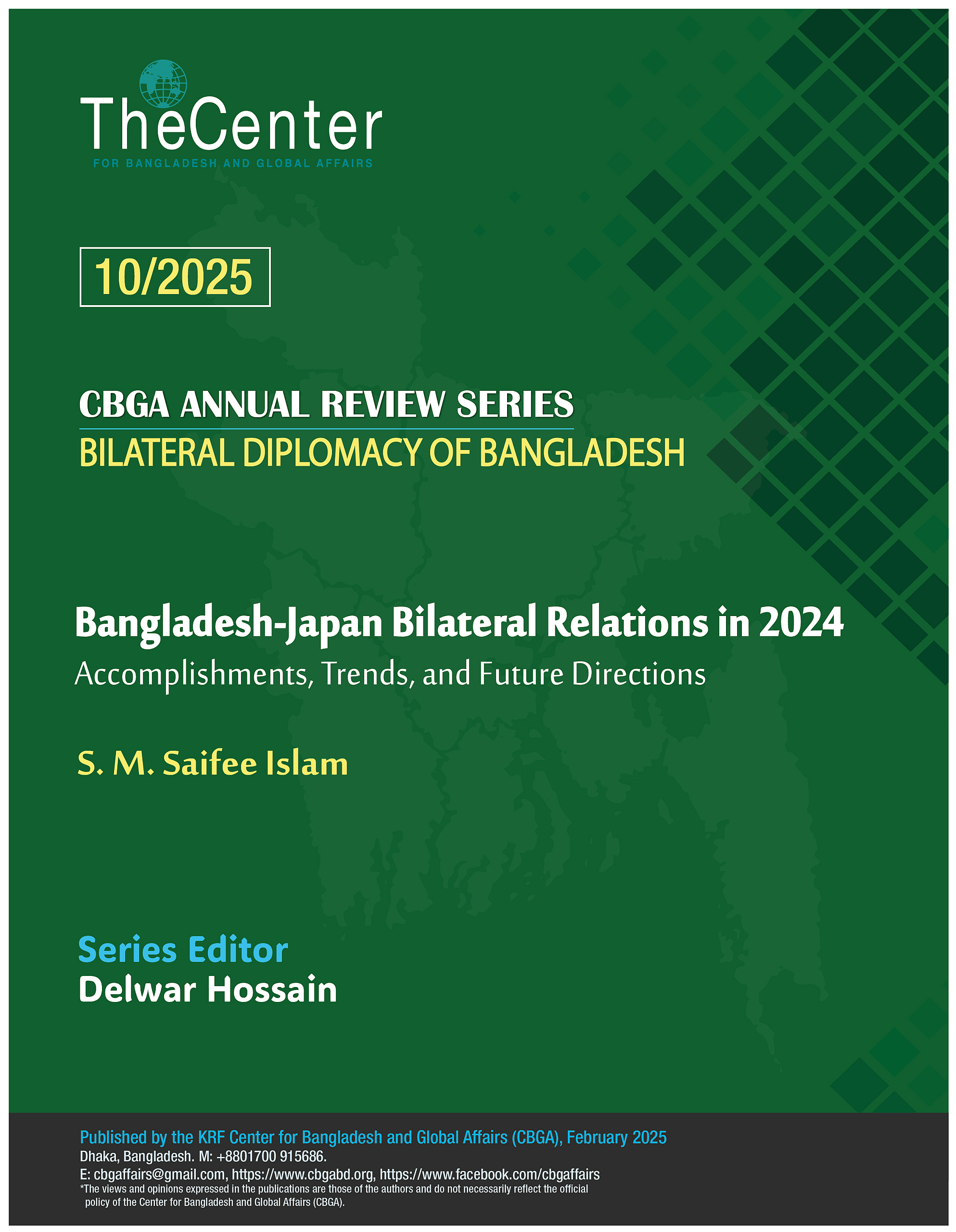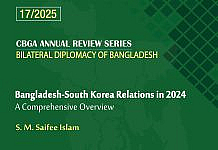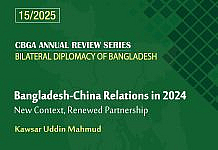
In 2024, Bangladesh and Japan made significant advancements in improving their bilateral relationship in the areas of economy, strategy, and development. One of the most important accomplishments was the progress made on the Economic Partnership Agreement (EPA), which both countries want to sign by the end of 2025 or the beginning of 2026. The Japan-Bangladesh Chamber of Commerce and Industry (JBCCI) took an important step in this direction by releasing the “EPA Study Report”. The consulting company Policy Exchange of Bangladesh developed a paper that outlined the possible advantages and disadvantages of the agreement. The research emphasized the need of ensuring that Bangladesh has access to a duty-free market when it graduates from the Least Developed Countries (LDC) category in 2026. The Japanese Embassy hosted a ceremony to commemorate this milestone, during which Iwama Kiminori, Japan’s Ambassador to Bangladesh, stated his hope that the EPA will help to increase commerce and investment between the two countries.
Japan confirmed its role as an important development partner for Bangladesh, and the two countries further deepened their commercial connections throughout this year. Japanese investments continued to provide assistance for important industries such as information and communications technology (ICT), transportation, energy, and agriculture. Japan has made a commitment to invest more in Bangladesh, including developing metro rail networks and encouraging the expansion of the private sector. They have also commended the country’s political stability. Japan has expanded its Official Security Assistance to Bangladesh, which strengthens military cooperation within the 2023 Strategic Partnership framework and aligns with Japan’s larger Indo-Pacific policy. Furthermore, Japan continued to be Bangladesh’s biggest supplier of Official Development Assistance (ODA), directing money into critical areas such as infrastructure, education, and healthcare. These advances not only strengthened the bilateral relationship, but they also established a solid basis for future collaboration in both economic and strategic areas.
Key Trends in 2024
Analysis of Bangladesh-Japan Strategic Relations in 2024
The transformation of Bangladesh-Japan relations into a Strategic Partnership in 2023 set the stage for a year of significant achievements in 2024, particularly in defense, economic collaboration, and regional connectivity. Japan’s Official Security Assistance (OSA) enhanced Bangladesh’s maritime capabilities, ensuring secure trade routes and regional stability in line with Japan’s Indo-Pacific strategy. This elevated security cooperation reflected a shared commitment to peace, stability, and adherence to international norms, marking a pivotal shift in their bilateral relations.
Economic collaboration flourished with progress toward the signing of the Economic Partnership Agreement (EPA) by 2025-26, aimed at securing duty-free market access for Bangladeshi exports post-LDC graduation. Japan’s role as Bangladesh’s largest bilateral development partner was reaffirmed through $1.66 billion in loans and grants for transformative projects, including metro rail expansions and port development. Additionally, technological advancements were fostered through initiatives in ICT, AI training, and leadership programs, ensuring long-term industrial modernization and human resource development.
Regional connectivity and sustainability emerged as crucial pillars of the partnership. Japan’s investment in transportation networks and special economic zones integrated Bangladesh into an industrial value chain connecting the Bay of Bengal and Northeast India. Collaborations on renewable energy and marine biodiversity research underscored their shared focus on climate resilience and eco-friendly technologies. These advancements not only strengthened bilateral ties but also positioned Bangladesh as a key player in South Asia’s economic framework, paving the way for inclusive and sustainable growth.
JICA’s Financial and Technical Support in 2024
In 2024, the Japan International Cooperation Agency (JICA) continued to play a pivotal role in Bangladesh’s development by providing robust financial and technical assistance. Notably, JICA extended an Official Development Assistance (ODA) loan of 30 billion Japanese Yen (approximately $200 million) to strengthen public financial management. This initiative aimed to improve revenue collection, enhance expenditure management, and support Bangladesh’s economic recovery in the face of global challenges like the COVID-19 pandemic and the Ukraine crisis. Additionally, JICA signed a grant agreement worth 495 million Japanese Yen (around $3.15 million) to fund Human Resource Development Scholarships (JDS) for 33 Bangladeshi government and central bank officials, emphasizing capacity building through higher education in Japan.

Development Funding and Sector-Specific Initiatives
During the first ten months of FY2023-24, Japan disbursed $1.66 billion in loans and grants, reinforcing its position as Bangladesh’s largest bilateral development partner. These funds supported major infrastructure projects, including the expansion of Dhaka’s metro rail network, the construction of the Jamuna rail bridge, and the development of Terminal 3 at Hazrat Shahjalal International Airport. Beyond infrastructure, JICA allocated funding for social security initiatives, focusing on research to strengthen welfare services for vulnerable groups, including women, children, and people with disabilities. Further sector-specific support included climate resilience measures, urban development, and energy infrastructure improvements.
Key Infrastructure Projects
JICA’s financial assistance extended to several transformative infrastructure projects. Notable among these were the Dhaka Metro Rail Projects, with $2.1 billion allocated for MRT Line-06 and additional funding for MRT Lines 01 and 05. The Matarbari Power Plant continued to receive support to enhance Bangladesh’s power generation capacity. Additionally, JICA funded the Chattogram Sewerage System Development Project, marking its commitment to urban development and environmental sustainability. These projects are critical for modernizing Bangladesh’s infrastructure and driving economic growth.
Looking ahead, JICA aims to expand its cooperation with Bangladesh in areas such as artificial intelligence (AI) training, smart city development, and climate resilience projects. It also seeks to foster private-sector investment, recognizing the importance of public-private partnerships in driving sustainable development. As Bangladesh prepares to graduate from Least Developed Country (LDC) status in 2026, JICA’s extensive financial and technical support underscores Japan’s commitment to strengthening its strategic partnership with Bangladesh. This collaboration will be instrumental in achieving the country’s long-term development objectives.
Bangladesh-Japan Trade Relations in 2024
It is worth mentioning that Japan is the fourth largest economy in the world and an important trading partner of Bangladesh. In the last fiscal year, 2022-23, Bangladesh imported goods worth $203 million from Japan. In the same fiscal year, Bangladesh exported goods worth $190 million to the country. In this connection, the strategic partnership will steer to negotiate an early possibility of signing a bilateral Economic Partnership Agreement (EPA), which may position Bangladesh to avoid the erosion of 97.9 percent Duty-Free Quota Free (DFQF) access of Bangladeshi products to the Japanese market during the post-LDC era.
In 2024, Bangladesh and Japan experienced significant growth in trade relations, driven largely by the surging demand for Bangladeshi Ready-Made Garments (RMG) in the Japanese market. Exports from Bangladesh to Japan grew steadily, reflecting the strengthening of their bilateral trade. Japan, on the other hand, explored ways to enhance its exports to Bangladesh by 31% through trade agreements and investments in key sectors. Both nations actively negotiated to simplify trade procedures, reduce tariffs, and streamline supply chains, highlighting their shared commitment to fostering a balanced and mutually beneficial trade relationship.
Trade data revealed notable trends. Bangladesh’s exports to Japan started at ¥19.9 billion in January, peaking at ¥27 billion in September and maintaining that level through October. This growth was largely fueled by rising demand for Bangladeshi apparel and textiles. Conversely, Japan’s exports to Bangladesh began at ¥20.8 billion in January, declining to ¥15.3 billion in September before rebounding slightly to ¥18.3 billion in October. By year’s end, Bangladesh had achieved a trade surplus, with its exports significantly surpassing Japan’s.
| Trade Indicator | Value (2024) |
| Bangladesh’s Exports to Japan | $1.90 billion |
| Japan’s Exports to Bangladesh | $2.02 billion |
| Bangladesh’s Trade Surplus/Deficit | Deficit of $0.12 billion |
| Key Export Sectors (Bangladesh) | RMG (83% of exports), Textiles, Leather |
| Key Import Sectors (Bangladesh) | Machinery, Vehicles, Iron, Steel |
Source: https://www.thedailystar.net/opinion/views/news/trade-deal-japan-will-boost-bangladeshs-post-ldc-success-3592676
The strengthening trade partnership signals promising prospects for both nations. Bangladesh’s export growth demonstrates its expanding capacity and competitive edge, while Japan’s efforts to boost exports reflect its strategic engagement in the South Asian market. The anticipated signing of the Economic Partnership Agreement (EPA) by 2026 is expected to further enhance bilateral trade by reducing tariffs and expanding market access, paving the way for sustained economic collaboration.
Focus on Sustainability
In 2024, both Bangladesh and Japan have prioritized aligning their economic goals with sustainability objectives, underscoring their commitment to environmental preservation and climate resilience. One notable area of focus has been the development of the blue economy under the Indo-Pacific framework. This initiative emphasizes the sustainable utilization of marine resources for economic growth, improved livelihoods, and ecosystem health. Collaborative efforts in this sector include joint research on marine biodiversity, capacity building for fisheries, and the adoption of eco-friendly technologies in maritime industries. Furthermore, Japan’s expertise in renewable energy and waste management has opened new avenues for Bangladesh to transition towards a greener economy, ensuring long-term environmental sustainability while maintaining economic growth. These trends not only reflect shared priorities but also set the stage for a future-oriented and sustainable partnership.
Looking Ahead
The Signing of the Economic Partnership Agreement (EPA)
The forthcoming signing of the Economic Partnership Agreement (EPA) between Bangladesh and Japan, projected for 2025-26, holds the promise of substantially boosting bilateral trade and fostering deeper economic collaboration. The EPA aims to enhance market opportunities for Bangladeshi goods and services in Japan, especially as Bangladesh prepares to transition from the Least Developed Country (LDC) status in 2026. The agreement also seeks to draw Japanese investment into burgeoning sectors, including ICT, renewable energy, and high-tech industries. This strategic maneuver is poised to reinforce Japan’s status as a premier trade ally and investor in Bangladesh, paving the way for sustained economic advancement and innovation.
Elevated Collaborative Development
Japan has demonstrated a resolute dedication to aiding Bangladesh in its seamless transition from LDC status, focusing on strategic reforms and capacity-building efforts. Japan is taking significant steps to modernize Bangladesh’s banking and customs systems, aiming to enhance financial transparency and boost trade efficiency. This initiative reflects a broader commitment to fostering economic growth and stability in the region. The anticipated reforms promise to simplify cross-border transactions, lower trade barriers, and improve the overall experience of conducting business. As Bangladesh navigates a pivotal transition, Japan’s commitment as the foremost provider of Official Development Assistance (ODA) is not merely a gesture; it is a strategic investment in the nation’s infrastructure, education, and healthcare. This approach is essential for fostering sustainable development and addressing the pressing needs of the population.
The Importance of Regional Connectivity
In a strategic move within the Indo-Pacific framework, Japan is setting its sights on incorporating Bangladesh into an expansive industrial value chain that spans the Bay of Bengal and Northeast India. This initiative aims to stimulate regional economic growth through the development of transportation and logistics networks, which are essential for enhancing trade flows and fostering industrial cooperation. Essential initiatives encompass the enhancement of port facilities, the expansion of road and rail networks, and the facilitation of special economic zones (SEZs) along vital trade corridors. This initiative stands to enhance regional connectivity, positioning Bangladesh as a crucial player in South Asia’s economic framework. It promises to strengthen relationships with neighboring nations while championing inclusive growth for all.
The Evolution of Human Resource Development
Japan is taking significant steps to enhance the human resource capacity of Bangladesh, exemplified by initiatives like the Japan International Cooperation Agency (JICA)’s Knowledge Co-Creation Program. The initiatives in question are designed to bolster both leadership and technical skills among professionals in Bangladesh, spanning a range of sectors such as public administration, engineering, and healthcare. By cultivating a talented and forward-thinking workforce, these initiatives will empower Bangladesh to tackle its developmental hurdles with greater efficacy and propel socioeconomic advancement. The ongoing partnership in this domain is essential to guarantee that the human resources necessary for sustainable development continue to be a fundamental aspect of the bilateral relationship.
To conclude, the year 2024 signified a transformative phase in Bangladesh-Japan relations, underscored by advancements in trade, strategic collaboration, and development initiatives. The steady progress toward the Economic Partnership Agreement (EPA) and Japan’s role as Bangladesh’s largest bilateral development partner illustrate the deepening of economic and infrastructural ties. Strategic reforms and sustainability efforts further solidified this partnership, aligning both nations with shared goals under the Indo-Pacific framework. Looking ahead, the anticipated EPA and continued investments in key sectors, including ICT, renewable energy, and regional connectivity, promise to elevate this bilateral relationship to new heights. These collaborative endeavors not only reinforce mutual trust and growth but also position Bangladesh as a vital player in regional trade and connectivity, paving the way for inclusive and sustainable development.
– S. M. Saifee Islam is a Research Associate at the KRF Center for Bangladesh and Global Affairs (CBGA).







